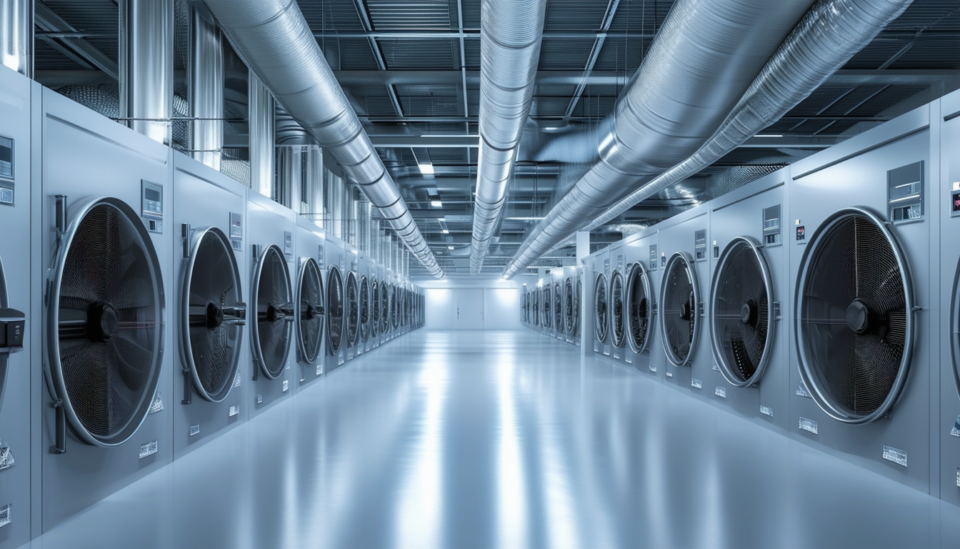Effective ventilation is the backbone of any safe, productive industrial environment. In settings like manufacturing plants, warehouses, and processing facilities, proper ventilation systems are essential for maintaining air quality, reducing health risks, and enhancing productivity. This article covers the importance of industrial ventilation, the types of systems commonly used, and where Fanquip’s expertise can provide tailored solutions for Australian industries.
The Importance of Proper Ventilation in Industrial Settings
Industrial spaces face unique air quality challenges due to pollutants like dust, fumes, and airborne particles generated by machinery and production processes. Without adequate ventilation, these contaminants can build up, posing serious health risks to workers and impacting the overall functionality of the workspace. Proper ventilation plays a crucial role in:
- Ensuring Health and Safety: By removing airborne contaminants, ventilation systems protect employees from respiratory issues and other health risks associated with prolonged pollutant exposure.
- Boosting Productivity: Clean, well-ventilated air helps reduce fatigue and improves focus, enabling employees to maintain productivity in demanding environments.
- Maintaining Compliance: Adhering to ventilation standards is essential for safety and compliance, especially in industries with strict air quality requirements, such as mining and food processing.
Types of Ventilation Systems for Industrial Workspaces
Choosing the right ventilation system depends on the nature of the workspace, pollutant levels, and air quality requirements. Here are the main types used in industrial settings:
Mechanical Ventilation
Mechanical ventilation is the most common choice in industries with high pollutant levels, such as manufacturing, mining, and heavy-duty processing. These systems use fans, ducts, and filtration units to continuously circulate air, removing contaminants like dust, smoke, and harmful gases. Mechanical ventilation is essential in environments where natural airflow is insufficient to manage air quality. Fanquip’s extraction solutions offer powerful, high-capacity fans specifically designed for industrial spaces with heavy contaminant loads.
See our blog: Where is Mechanical Ventilation Required
Natural Ventilation
Natural ventilation utilises design elements like windows, vents, and doors to circulate fresh air without mechanical assistance. This type of system works best in open, low-pollutant areas, such as large warehouses, where simple airflow solutions can regulate temperature and maintain adequate air quality. While effective in some applications, natural ventilation may be limited in controlling high levels of contaminants or maintaining consistent airflow across large areas.
Hybrid Ventilation Systems
Hybrid ventilation systems combine natural and mechanical methods to create an adaptable solution that balances energy efficiency and air quality. By automatically adjusting between natural airflow and mechanical support as needed, hybrid systems are ideal for facilities with variable environmental conditions, such as production spaces with seasonal temperature shifts. Hybrid systems offer a flexible, energy-efficient solution for workplaces aiming to reduce energy use without compromising air quality.
Each of these systems plays a unique role in managing air quality, controlling temperature, and removing pollutants, contributing to a healthier and more productive industrial environment.
Common Applications of Ventilation in Industry
In addition to selecting the right system, understanding the specific ventilation needs of each industry is crucial. Here’s how ventilation supports key Australian industries:
- Agriculture: In agricultural facilities, ventilation systems help manage dust, odours, and harmful gases. Products like Fanquip’s industrial filtration solutions are critical in maintaining safe air quality for livestock and workers.
- Food Processing: Ventilation in food processing facilities prevents contamination by removing pollutants and regulating airflow. Effective filtration and temperature control are essential to comply with strict hygiene standards.
- Mining and Metals: In mining, proper ventilation systems are necessary to extract airborne particles and maintain breathable air. Fanquip’s industrial extraction fans and filtration solutions are ideal for removing particulates and controlling dust.
- Oil and Gas: Ventilation in oil and gas facilities prevents the build-up of hazardous gases, ensuring a safe working environment. Extraction and filtration systems are crucial for compliance and operational safety.
- Warehousing: For warehouses, ventilation systems help manage temperature and air quality, protecting both workers and stored goods from extreme conditions.
Why Choose Fanquip for Industrial Ventilation?
Fanquip specialises in ventilation solutions that are robust, efficient, and tailored to the unique needs of industrial settings. With expertise in mechanical ventilation, extraction, filtration, and temperature control, Fanquip provides comprehensive solutions that support health, safety, and productivity. Whether you’re in agriculture, manufacturing, or mining, our ventilation systems are designed to keep industrial spaces compliant and productive.
Proper ventilation is more than just an air quality measure—it’s an investment in the safety and success of your operations. Learn more about Fanquip’s cooling, extraction, filtration, and heating solutions and how we can optimise your workspace for a cleaner, healthier, and more efficient environment.
